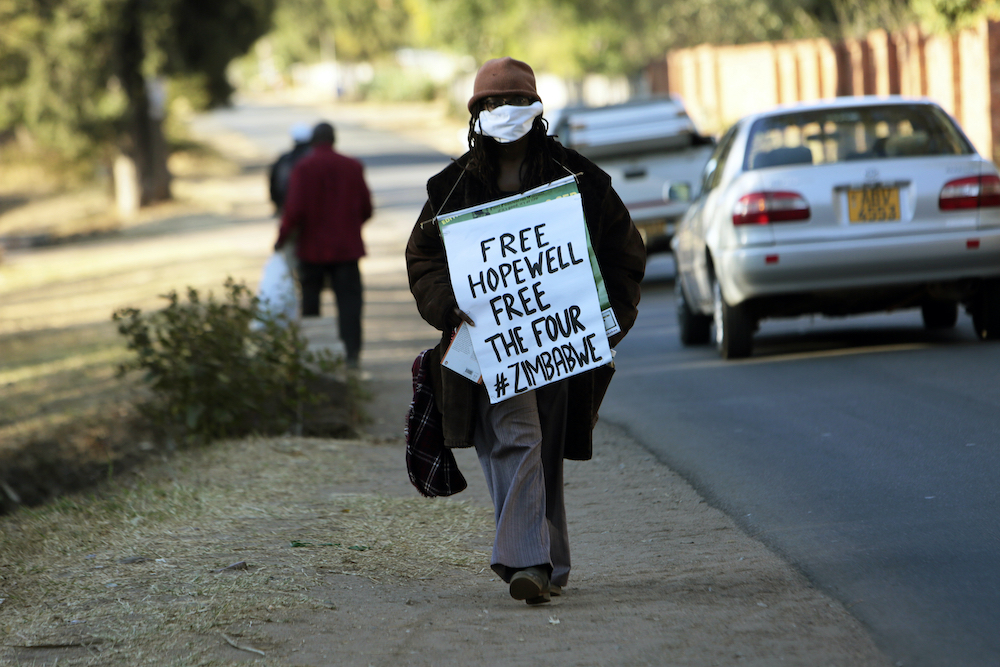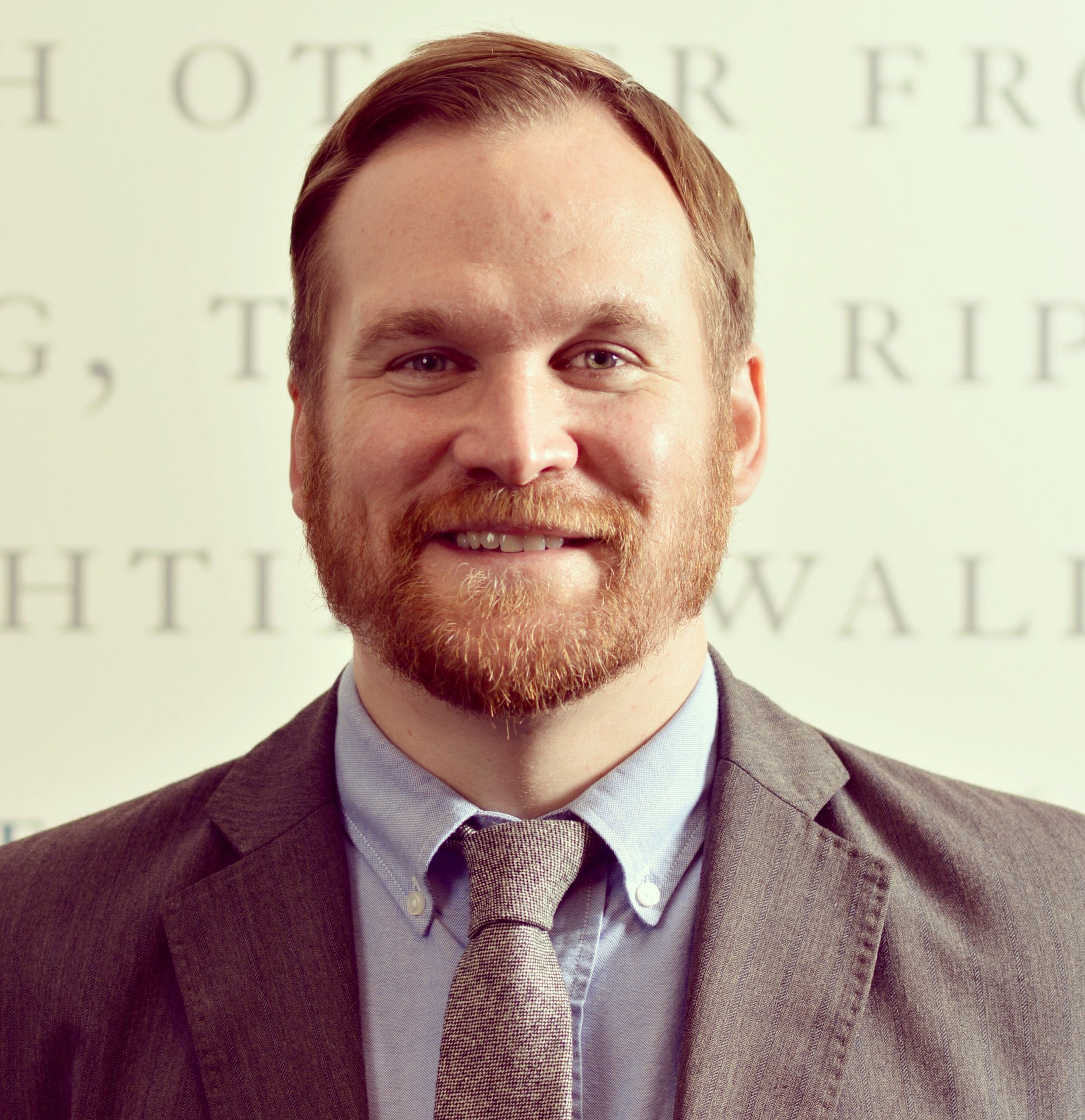
Zimbabwean writer and filmaker Tsitsi Dangarembwa demonstrates outside Hopwell Chin'ono’s house in Harare on July 20, 2020. Zimbabwe arrested Chino'ono, a prominent journalist, ahead of planned government protests end of the month
Today, nearly every African country holds multiparty elections of some kind, but – as in the case worldwide – relatively few fully respect political rights and civil liberties. This situation was already worrying before the pandemic. In 2019, advocacy group Freedom House touted the headline “Global Press Freedom in Peril” and gave most African countries a 0 or 1 (of a maximum 4) for media freedoms. Stories like that of Laura Miti, a pioneering Zambian journalist arrested in December 2019 while attempting to help human rights defender Pilato (Fumba Chama), were far from remarkable.
However, since COVID-19 hit, matters have got worse as ruling parties attempt to avoid criticism and maintain control over how the pandemic is viewed. Even as we were editing this piece, Zimbabwe’s highly respected journalist Hopewell Chin’ono was abducted from his house after writing a series of articles and social media messages that were highly critical of the government of President Emmerson Mnangagwa. Human rights groups immediately responded by demanding for his safe release.
Given that many African governments performed comparatively well in terms of restricting the spread of the virus, one might not expect the pandemic to have increased political pressure on the media. Yet many governments that have taken the disease seriously have also sought to evade scrutiny by undermining press freedom and civil liberties. Two – Madagascar and Tanzania – have consistently chosen to deny the significance of coronavirus altogether.
As the number of COVID-19 cases trends upwards again, there is a serious risk that harassment and censorship will only get worse. Indeed, in recent weeks, governments have increasingly harassed journalists seeking to tell the truth about the extent of the crisis and hold the ruling party responsible. In Somalia, an editor was arrested on charges of spreading fake news. In Niger, a journalist was arrested for social media posts about the pandemic. In Nigeria, reporters have been threatened and harassed in at least five different parts of the country. Egypt has expelled foreign journalists for writing critical stories. And as the abduction of Chin’ono demonstrates, journalists are under constant threat in Zimbabwe.
According to the Committee to Protect Journalists, there have been more than 20 major incidents since the pandemic began, with attacks on press freedom in 13 different African countries.
Significantly, this is not just a problem in more authoritarian states. Some of the continent’s most democratic countries have also seen repression. In Ghana, two journalists researching a story on COVID-19 were assaulted by soldiers. In Liberia, which suspended the right to free speech as part of the state of emergency imposed in April, security forces have attacked or intimidated at least four journalists. And in South Africa, which criminalised “disinformation” with the threat of fines and jail time for those who contradict the government’s own narrative, there have been three separate attacks on journalists. The legal changes are particularly worrying because they threaten to introduce restrictions on freedom of speech that will remain on the statute books long after the threat of COVID-19 has receded.
Branding criticism of the government as “fake news” is an especially effective way to attack press freedom, because there is already widespread concern about the impact of misinformation and disinformation on public health and political stability. It is one reason the Afrobarometer survey has recorded a significant recent decline in support for free speech on the continent, saying: “Popular support for media freedom – a majority view just three years ago – is now in the minority, exceeded by those who would grant governments the censor’s pencil.”
By presenting media harassment as part of a strategy to combat fake news – which does present a real challenge to an effective coronavirus response – governments can make their actions more palatable to both domestic and international audiences. The arrest and abuse of Swaziland News editor Zweli Martin Dlamini on trumped up charges of circulating fake for articles critical of the King’s news handling of the economy and failure to protect women from abuse is a case in point.
Of course, the harassment of journalists is only one part of a broader picture in which human rights have come under greater threat. The levels of violence inflicted by security forces while enforcing COVID-19 related restrictions are also deeply troubling. Deaths and human rights abuses have been recorded in Kenya, Uganda, Rwanda, and South Africa, among others. According to the Armed Conflict Location and Event Data Project, “there have been over 250 instances of political violence in 33 African countries that have collectively led to almost 100 killed civilians in the context of governments’ coronavirus response.”
More troubling, it is likely that these figures underestimate the extent of the problem, as many journalists self-censor in order to avoid becoming the target of violence or reprisals. Those who try to expose and resist state oppressions risk arrest and worse. The Kenyan journalist and activist Boniface Mwangi was arrested this month for demanding the release of protesters who had been detained following a march to complain, among other things, about police brutality.
This repression is bad news for civil liberties and democracy, but it is also bad news for an effective response to the coronavirus pandemic. A free press improves our understanding of the issues. It also prevents the ruling party from underplaying the number of cases and forces governments to perform better and meet citizen expectations. As the African Centre for Security Studies recently put it: “As the pandemic expands across Africa, a free press will continue to be an integral component for mitigating the outbreak by serving as an early warning system and helping to target public health responses.”
Censorship and the harassment of journalists and activists are not just human rights issues. Today, more than ever, they are a matter of life and death.
This article was re-published with permission from Africanarguments.org. The authors are members of the Resistance Bureau, a global discussion on the most pressing issues that confront Africa today.



